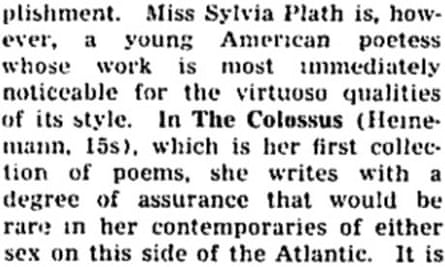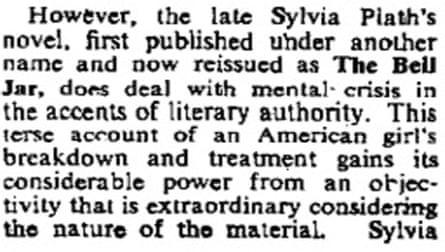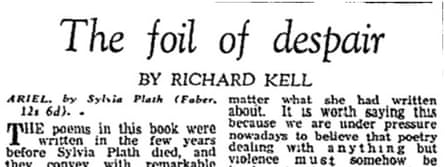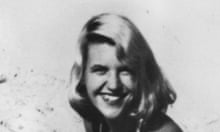Sylvia Plath, who was born on 27 October 1932 and died aged 30 in 1963, published only two works during her lifetime, the poetry collection The Colossus and the novel The Bell Jar. The majority of her poetry was published posthumously, and most of the reviews of her work react against the knowledge of her suicide. Reading through reviews of her work, before her poetry became so intrinsically linked to her death, is an interesting experiment.
Her first collection, The Colossus, was published in 1960, and was reviewed by Bernard Bergonzi for the Guardian.

Bergonzi is full of praise for the American's first collection, admiring Plath's "highly personal tone and way of looking at the world", concluding that he "read this collection with considerable pleasure". Plath was not yet well known as a poet in the UK, although she had had poems published in the Observer, and Bergonzi offers up Plath as an example to "those inquiring spirits who demand if there are any new poets worth reading."

The Bell Jar, the semi-autobiographical novel which so many Plath enthusiasts have mined for clues and parallels, was originally published under the pseudonym Victoria Lucas in 1963, shortly before Plath's death. The Guardian's review (above) is probably the last time the novel is ever referred to as "a sprightly little tale" - by the time the novel is reissued under Plath's name in 1966, the cult of Sylvia is already taking hold. The Observer's 1966 review (below) discusses Plath's literary authority and "unwinking intelligence."

Her earlier work can perhaps be seen to lack the carefully finished ferocity of her later, and final, poems; Plath herself had seen The Bell Jar as something she needed to write out of herself in order to move on to more important work. The week after Plath's death in 1963 - it was still, at that time, euphemistically referred to as that, rather than her suicide - Al Alvarez, the poetry editor of the Observer who had championed her poetry, wrote in the paper that her last poems "[establish] her as the most gifted woman poet of our time."
In 1965, a version of her poetry collection Ariel, edited by Ted Hughes and containing some of these final poems, was published.

It was these poems that established Plath's reputation - and also established the idea that she raced headlong into suicide through her art. In his study on suicide, The Savage God, published in 1971, Alvarez writes that "the pity is not that there is a myth of Plath but that the myth is not simply that of an enormously gifted poet whose death came...too soon."











Comments (…)
Sign in or create your Guardian account to join the discussion